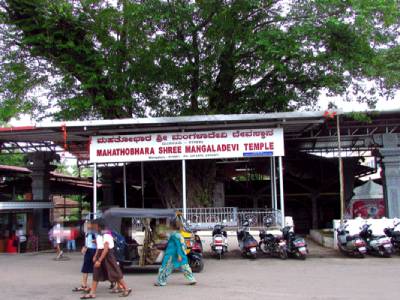
Ahead of the Hindu festival of Navratri, the Dakshina Kannada and Udupi Districts Religious Fair Businessmen’s Coordination Committee has demanded that Muslim vendors be allowed to carry out trade on the temple premises during the festive days even as the temple authorities have restricted them from doing so.
The committee members had filed a complaint with the District Commissioner of Dakshina Kannada over the boycott of Muslim vendors during the Navaratri celebrations at the renowned Mangaladevi Temple in Mangaluru, Dakshina Kannada district. The honorary presidents of the committee DK Imthiyaz and Sunil Kumar Bajal have claimed that Muslim vendors were excluded during the auction process undertaken to allot shops in the temple premises.
Contrary to the Imthiyaz and Bajal’s claims, the temple management said that there was no restriction on Muslim vendors adding that the auction process for 94 shops in the temple courtyard was open for all, however, no non-Hindu trader participated in the auction. The temple management said that the auction process was conducted in accordance with the guidelines laid by the District Collector.
It is worth noting that the Mangaladevi Temple comes under the state government’s Muzrai (Hindu religious endowment) department. Every year, a Navratri fair is organised at this temple dedicated to Goddess Shakti. This time the fair will take place between October 15 and October 24.
The temple management had decided not to allow Muslim traders to participate in the fair and had begun the process of allocating stalls to businessmen on Rathabeedi Street, which is owned by the Mangaluru City Corporation. However, the temple administration has been holding its fairs here for many years.
It is pertinent to note that Around 34,563 temples in the state are classified as Muzrai (Hindu religious endowment) grade A, B, or C depending on their revenue generation.
In all, a total of 207 temples with yearly revenue exceeding Rs 25 lakh fall into category A, 139 temples with annual revenue between Rs 5 lakh and Rs 25 lakh fall into category B, and 34,217 temples with annual revenue less than Rs 5 lakh go into category C. This categorisation was introduced by the Congress government in 2019.
Last year, a controversy had erupted over the issue of not allowing non-Hindu particularly Muslim traders to put up stalls near Hindu temples. The demand for the same was raised by Hindu rights organisations including Bajrang Dal.
According to the Hindu rights organisation, Rule 12 of the Karnataka Hindu Religious Institutions and Charitable Endowments Act, 2002, is intended to prohibit non-Hindu traders. The law states that “No property, including land, building or sites situated near the premises shall be leased to non-Hindus.”
Source: OpIndia




